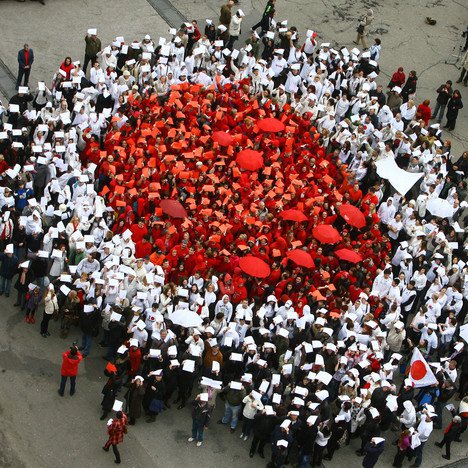This post is part of our special coverage Japan Earthquake 2011.
There's an old Serbian saying that goes like this: “Make good things and hope for the good things.” These days, this traditional folk wisdom is being confirmed in practice.
At the moment when Japan faces an unprecedented tragedy, Serbian people express their solidarity in many ways, returning their gratitude for the donations that the Japanese government has been providing to Serbia since 1999. They have not forgotten the Japanese POPOS grants, which covered the basic and urgent needs of the Serbian population: health care, primary education, poverty reduction, social and environmental protection, and general well-being.

Facebook group of Serbian citizens expressed solidarity with the Japanese by forming the Japanese flag with their bodies. Image by Facebook group Ljubitelji Japana – Tokyorama.
The latest Japanese donations were given in March 2011. Despite its own horrible situation, the government of Japan donated $125,000 to the Serbian towns of Vlasotince and Sokobanja, to support the improvement of environmental services in Serbia. This month, the Japanese government also donated 77,943 euro to Paraplegic Association of Banat, Srem and the Center of Social Work in Paracin.
Respecting the fact that all of these funds (more than 200 million euro in total) were raised from taxpayers of Japan, Serbian citizens feel the need to return the gratitude to the friendly people of the Far East.
The city of Belgrade has donated 25 million dinars (2.5 million euro) to help Japan, while three Serbian mobile operators (VIP, MTS and Telenor) have launched a text messaging option through which Serbian citizens can send messages of support to Japan that cost 50 dinar (0.5 euro).
This SMS campaign was initiated by Serbian netizens on Twitter. Those posting with the #jazajapan (“I am for Japan”) hashtag could not hide their joy for the success of the action:
For two days, Vip users sent 47,000 messages!
I would adopt some little Japanese if it is possible :)
Serbia has so many spas. Someone in this country should offer the Japanese to come here for recovery.
Serbia has offered Japan a rescue team of 25 people, 3 tons of equipment and 2 search dogs
Postal workers of the city of Cacak are willing to host 17 Japanese children in their homes. They are grateful for the Japanese donation to the local health center in various appliances and equipment worth $1 million. Lucani and Gornji Milanovac, postal workers from the Serbian town of Ivanjica, follow their colleagues from Cacak in their wish to provide refuge to Japanese children. Nada Markovic, a Kosovo refugee and a mother of four, living in village Atenica near Cacak, applied for the adoption of two children from this distant land.
In a letter to the Japanese Ambassador, students from Medvedja, one of the poorest Serbian municipalities, write:
We offer our humble, warm homes and souls for the children of Japan. We are willing to share what we have. We believe that the people of Japan will soon rebuild the destroyed cities and towns.
On March 18, musicians of the Belgrade Philharmonics held a concert at Kolarac National University, dedicated to the people of Japan who died in the earthquake and tsunami. The concert began with a minute of silence for the victims of the disaster. The Japanese government had donated to the Belgrade Philharmonic Orchestra in 2005.
Hundreds of people participated in the action “1,000 paper cranes for Japan” at the invitation of a group of B92 bloggers in Belgrade. The cranes, made of paper in the origami technique, will be handed over to Toshio Tsunozaki, the Japanese Ambassador in Belgrade, with a message that Serbs have “the Japanese people in their hearts and minds in the difficult days of survival.” Instructions for making cranes were shown on video, and visitors could enjoy the Japanese music during the activities. Serbian blog Tokoyorama published the guidelines for making paper cranes in the origami technique.
On Facebook, a group of Serbian citizens publicly expressed solidarity with the Japanese by forming the Japanese flag with their bodies. They sent this message:
Endure, we will be with you, stay brave.
Serbian bloggers were shocked by the image of a Japanese woman standing in front of the empty shelves in a store, which reminded them of the Serbian trauma from the 90s. Below are some of the reactions from the Vujaklija.com forum.
Dumke asks:
Is this possible?
Micko replies:
That is all… 5 kilograms of mustard.
Shinnok is being sarcastic:
The woman stands there, wondering what to take… [as if she has a choice].
xTx praises the Japanese:
If you were watching CNN, the Japanese are not grabbing things in shops as much as they can […]. There is a video of them at a destroyed shop. Each person takes one bottle of water, no more, and leaving money on the cash register. We [in Serbia] would steal even the shelf on which the bottles stand.
This post is part of our special coverage Japan Earthquake 2011.







1 comment